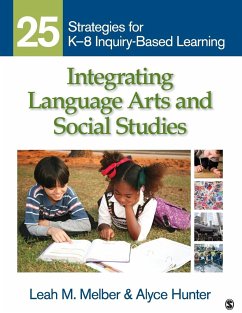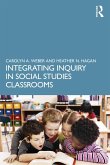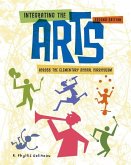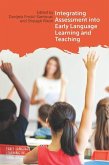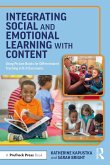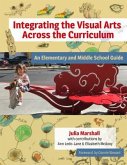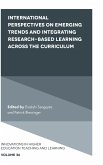Leah M. Melber, Alyce A. Hunter
Integrating Language Arts and Social Studies
25 Strategies for K-8 Inquiry-Based Learning
Leah M. Melber, Alyce A. Hunter
Integrating Language Arts and Social Studies
25 Strategies for K-8 Inquiry-Based Learning
- Broschiertes Buch
- Merkliste
- Auf die Merkliste
- Bewerten Bewerten
- Teilen
- Produkt teilen
- Produkterinnerung
- Produkterinnerung
This book looks at social science techniques that integrate language arts with an inquiry-based approach to social science
Andere Kunden interessierten sich auch für
![Integrating Inquiry in Social Studies Classrooms Integrating Inquiry in Social Studies Classrooms]() Carolyn WeberIntegrating Inquiry in Social Studies Classrooms45,99 €
Carolyn WeberIntegrating Inquiry in Social Studies Classrooms45,99 €![Integrating the Arts Across the Elementary School Curriculum Integrating the Arts Across the Elementary School Curriculum]() Phyllis Gelineau (Southern Connecticut State University)Integrating the Arts Across the Elementary School Curriculum225,99 €
Phyllis Gelineau (Southern Connecticut State University)Integrating the Arts Across the Elementary School Curriculum225,99 €![Integrating Assessment Into Early Language Learning and Teaching Integrating Assessment Into Early Language Learning and Teaching]() Integrating Assessment Into Early Language Learning and Teaching177,99 €
Integrating Assessment Into Early Language Learning and Teaching177,99 €![Integrating Social and Emotional Learning with Content Integrating Social and Emotional Learning with Content]() Sarah Bright (USA Purdue University)Integrating Social and Emotional Learning with Content38,99 €
Sarah Bright (USA Purdue University)Integrating Social and Emotional Learning with Content38,99 €![Integrating Social and Emotional Learning with Content Integrating Social and Emotional Learning with Content]() Katherine KapustkaIntegrating Social and Emotional Learning with Content27,99 €
Katherine KapustkaIntegrating Social and Emotional Learning with Content27,99 €![Integrating the Visual Arts Across the Curriculum Integrating the Visual Arts Across the Curriculum]() Julia MarshallIntegrating the Visual Arts Across the Curriculum40,99 €
Julia MarshallIntegrating the Visual Arts Across the Curriculum40,99 €![International Perspectives on Emerging Trends and Integrating Research-based Learning across the Curriculum International Perspectives on Emerging Trends and Integrating Research-based Learning across the Curriculum]() International Perspectives on Emerging Trends and Integrating Research-based Learning across the Curriculum135,99 €
International Perspectives on Emerging Trends and Integrating Research-based Learning across the Curriculum135,99 €-
-
-
This book looks at social science techniques that integrate language arts with an inquiry-based approach to social science
Hinweis: Dieser Artikel kann nur an eine deutsche Lieferadresse ausgeliefert werden.
Hinweis: Dieser Artikel kann nur an eine deutsche Lieferadresse ausgeliefert werden.
Produktdetails
- Produktdetails
- Verlag: SAGE Publications Inc
- Seitenzahl: 208
- Erscheinungstermin: 11. September 2009
- Englisch
- Abmessung: 280mm x 216mm x 11mm
- Gewicht: 506g
- ISBN-13: 9781412971102
- ISBN-10: 1412971101
- Artikelnr.: 27293405
- Herstellerkennzeichnung
- Books on Demand GmbH
- In de Tarpen 42
- 22848 Norderstedt
- info@bod.de
- 040 53433511
- Verlag: SAGE Publications Inc
- Seitenzahl: 208
- Erscheinungstermin: 11. September 2009
- Englisch
- Abmessung: 280mm x 216mm x 11mm
- Gewicht: 506g
- ISBN-13: 9781412971102
- ISBN-10: 1412971101
- Artikelnr.: 27293405
- Herstellerkennzeichnung
- Books on Demand GmbH
- In de Tarpen 42
- 22848 Norderstedt
- info@bod.de
- 040 53433511
Leah M. Melber, Ph.D. has nearly 20 years experience within informal and formal science education. She holds a BA in Zoology, an MA in education together with a multiple subject teaching credential for the state of California, and a Ph.D. in educational psychology from the University of Southern California. She has presented widely on inquiry-based instruction and effective methods of connecting with cultural institutions such as museums. In addition to numerous journal articles she has written on this topic, she has recently published a book titled "Informal Learning and Field Trips". She was awarded the 2001 Informal Educator Award through the California Science Teachers Association. She joined the staff of Lincoln Park Zoo in December of 2008.
Preface
Unit I: Building Research Skills
Strategy 1: Teaching Observation, Questioning, and Inference
Strategy 2: Oral Histories in the Curriculum
Strategy 3: Data Collection and Analysis
Strategy 4: Using Authentic Models
Strategy 5: Images as Primary Sources
Unit II: Connecting to Community
Strategy 6: Personally Relevant History
Strategy 7: Developing Mapping Skills
Strategy 8: Connecting With Cultural Institutions
Strategy 9: Conducting Social Science Fieldwork
Strategy 10: Incorporating Service Learning
Unit III: Multiple Voices
Strategy 11: Connecting With the Visual Arts
Strategy 12: Culturally Responsive Teaching Techniques
Strategy 13: Connecting With Literature
Strategy 14: Authentic Role Play
Strategy 15: Establishing a Pluralist Approach to Content
Unit IV: Past and Present
Strategy 16: Incorporating Historical Reenactment
Strategy 17: Personal Correspondence as a Primary Source
Strategy 18: Systematic Artifact Investigation
Strategy 19: Relevant Approaches to Economics
Strategy 20: Symbolism and Social Studies
Unit V: Understanding Our World
Strategy 21: Connecting to Music Studies
Strategy 22: Currency as a Primary Source
Strategy 23: Stamps as Primary Sources
Strategy 24: Understanding Global Symbols
Strategy 25: Authentic Geography and Cartography Studies
About the Authors
Unit I: Building Research Skills
Strategy 1: Teaching Observation, Questioning, and Inference
Strategy 2: Oral Histories in the Curriculum
Strategy 3: Data Collection and Analysis
Strategy 4: Using Authentic Models
Strategy 5: Images as Primary Sources
Unit II: Connecting to Community
Strategy 6: Personally Relevant History
Strategy 7: Developing Mapping Skills
Strategy 8: Connecting With Cultural Institutions
Strategy 9: Conducting Social Science Fieldwork
Strategy 10: Incorporating Service Learning
Unit III: Multiple Voices
Strategy 11: Connecting With the Visual Arts
Strategy 12: Culturally Responsive Teaching Techniques
Strategy 13: Connecting With Literature
Strategy 14: Authentic Role Play
Strategy 15: Establishing a Pluralist Approach to Content
Unit IV: Past and Present
Strategy 16: Incorporating Historical Reenactment
Strategy 17: Personal Correspondence as a Primary Source
Strategy 18: Systematic Artifact Investigation
Strategy 19: Relevant Approaches to Economics
Strategy 20: Symbolism and Social Studies
Unit V: Understanding Our World
Strategy 21: Connecting to Music Studies
Strategy 22: Currency as a Primary Source
Strategy 23: Stamps as Primary Sources
Strategy 24: Understanding Global Symbols
Strategy 25: Authentic Geography and Cartography Studies
About the Authors
Preface
Unit I: Building Research Skills
Strategy 1: Teaching Observation, Questioning, and Inference
Strategy 2: Oral Histories in the Curriculum
Strategy 3: Data Collection and Analysis
Strategy 4: Using Authentic Models
Strategy 5: Images as Primary Sources
Unit II: Connecting to Community
Strategy 6: Personally Relevant History
Strategy 7: Developing Mapping Skills
Strategy 8: Connecting With Cultural Institutions
Strategy 9: Conducting Social Science Fieldwork
Strategy 10: Incorporating Service Learning
Unit III: Multiple Voices
Strategy 11: Connecting With the Visual Arts
Strategy 12: Culturally Responsive Teaching Techniques
Strategy 13: Connecting With Literature
Strategy 14: Authentic Role Play
Strategy 15: Establishing a Pluralist Approach to Content
Unit IV: Past and Present
Strategy 16: Incorporating Historical Reenactment
Strategy 17: Personal Correspondence as a Primary Source
Strategy 18: Systematic Artifact Investigation
Strategy 19: Relevant Approaches to Economics
Strategy 20: Symbolism and Social Studies
Unit V: Understanding Our World
Strategy 21: Connecting to Music Studies
Strategy 22: Currency as a Primary Source
Strategy 23: Stamps as Primary Sources
Strategy 24: Understanding Global Symbols
Strategy 25: Authentic Geography and Cartography Studies
About the Authors
Unit I: Building Research Skills
Strategy 1: Teaching Observation, Questioning, and Inference
Strategy 2: Oral Histories in the Curriculum
Strategy 3: Data Collection and Analysis
Strategy 4: Using Authentic Models
Strategy 5: Images as Primary Sources
Unit II: Connecting to Community
Strategy 6: Personally Relevant History
Strategy 7: Developing Mapping Skills
Strategy 8: Connecting With Cultural Institutions
Strategy 9: Conducting Social Science Fieldwork
Strategy 10: Incorporating Service Learning
Unit III: Multiple Voices
Strategy 11: Connecting With the Visual Arts
Strategy 12: Culturally Responsive Teaching Techniques
Strategy 13: Connecting With Literature
Strategy 14: Authentic Role Play
Strategy 15: Establishing a Pluralist Approach to Content
Unit IV: Past and Present
Strategy 16: Incorporating Historical Reenactment
Strategy 17: Personal Correspondence as a Primary Source
Strategy 18: Systematic Artifact Investigation
Strategy 19: Relevant Approaches to Economics
Strategy 20: Symbolism and Social Studies
Unit V: Understanding Our World
Strategy 21: Connecting to Music Studies
Strategy 22: Currency as a Primary Source
Strategy 23: Stamps as Primary Sources
Strategy 24: Understanding Global Symbols
Strategy 25: Authentic Geography and Cartography Studies
About the Authors

